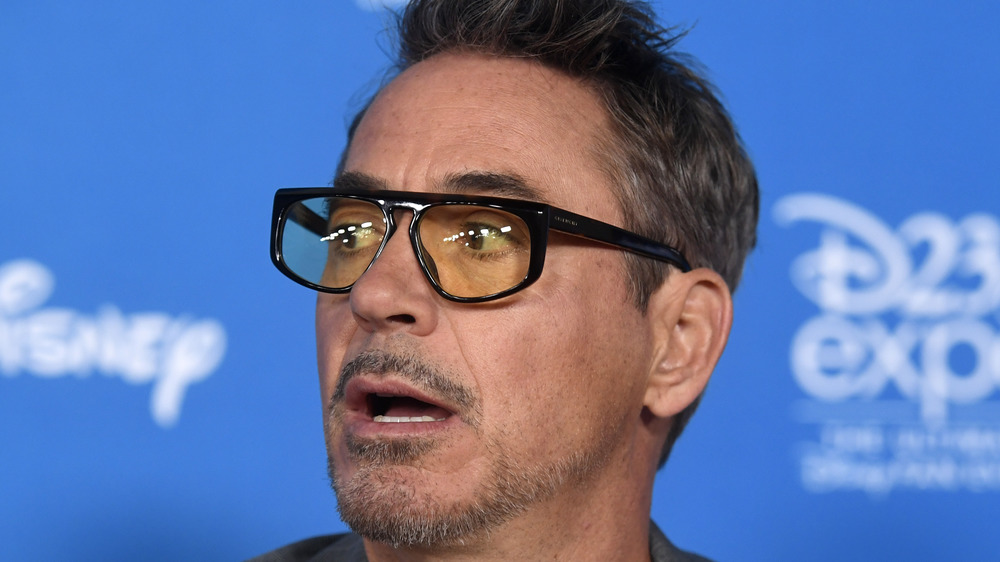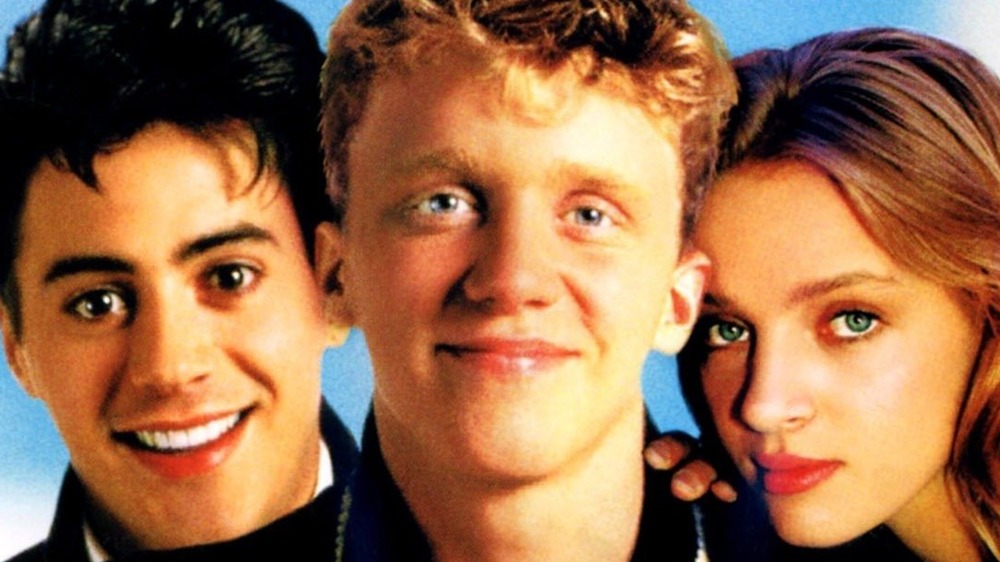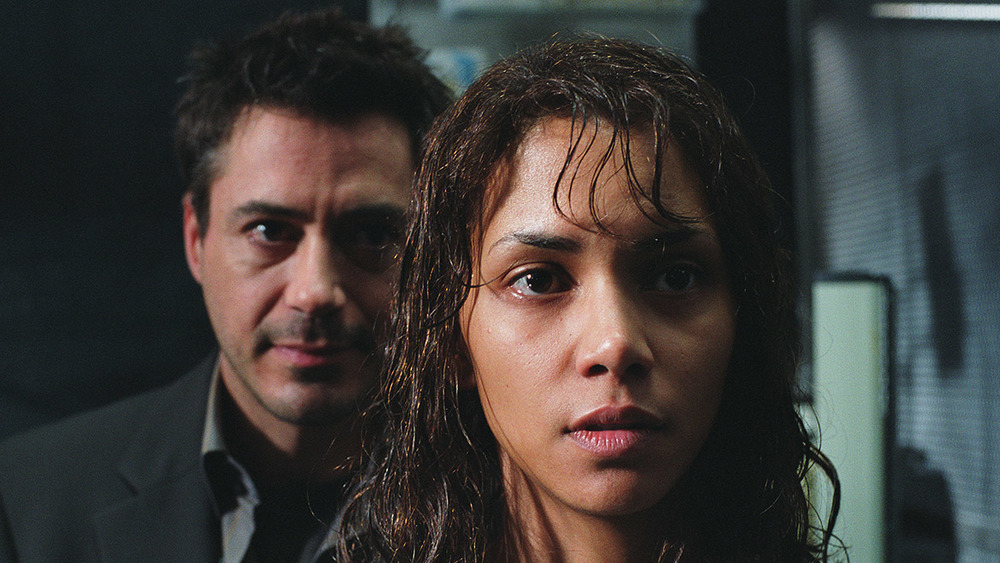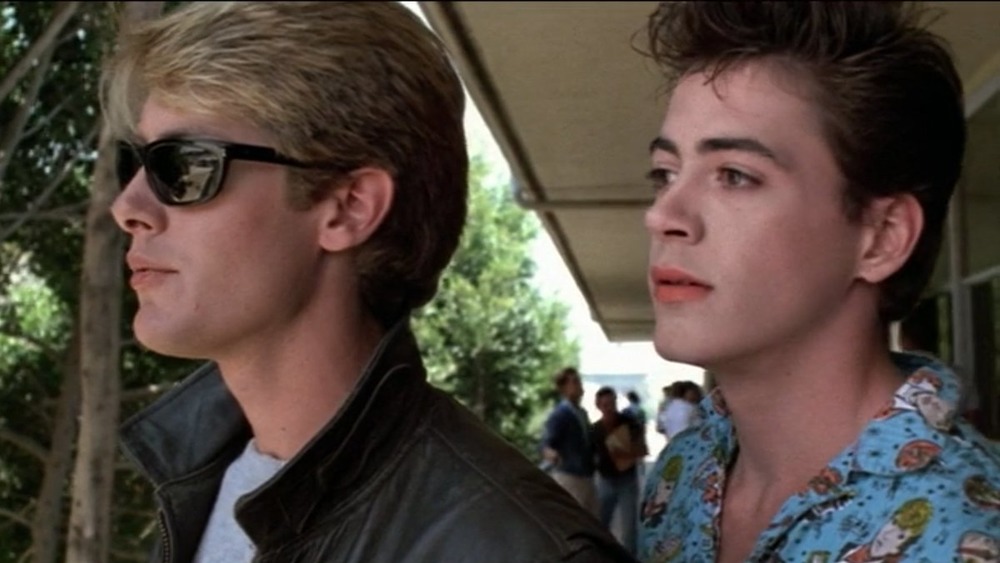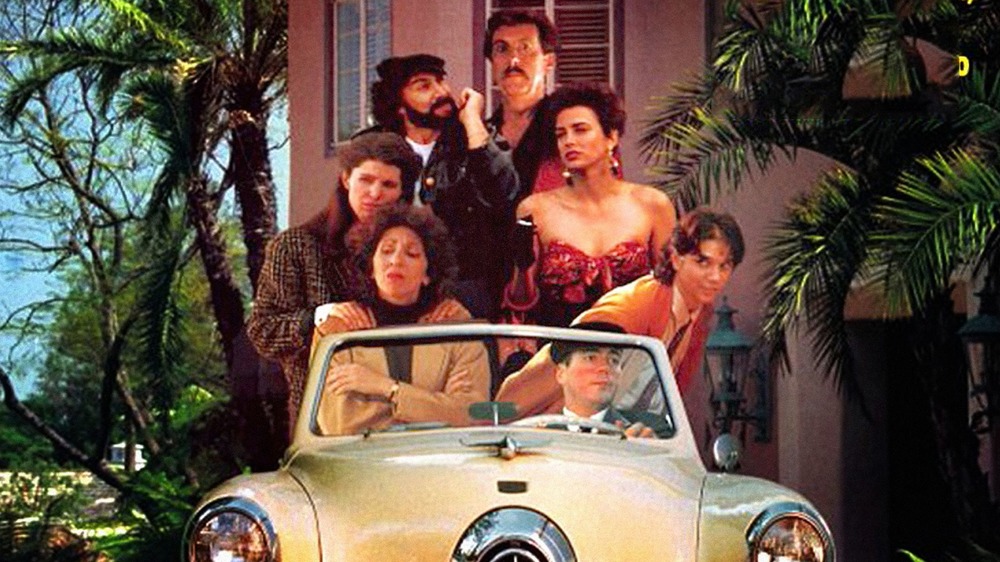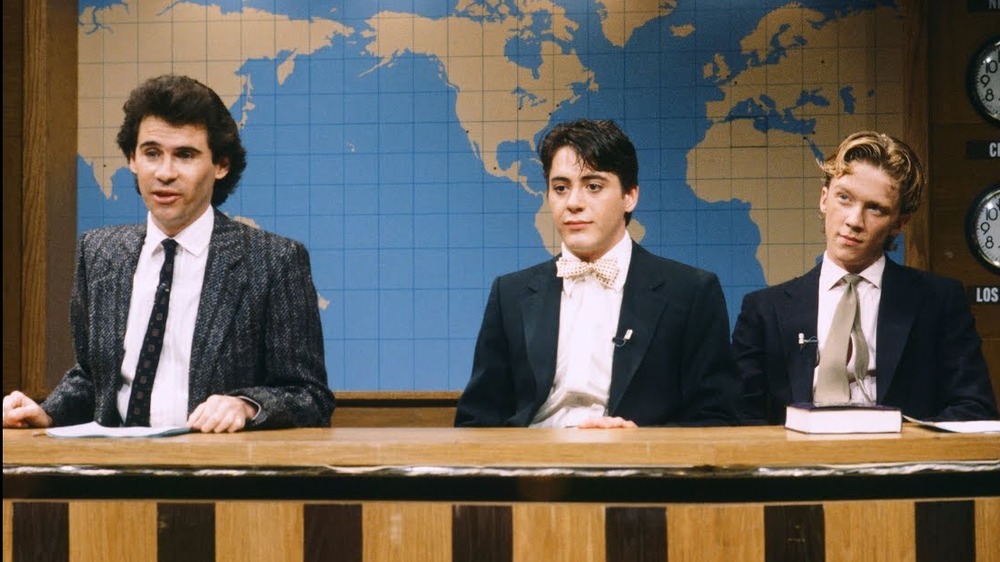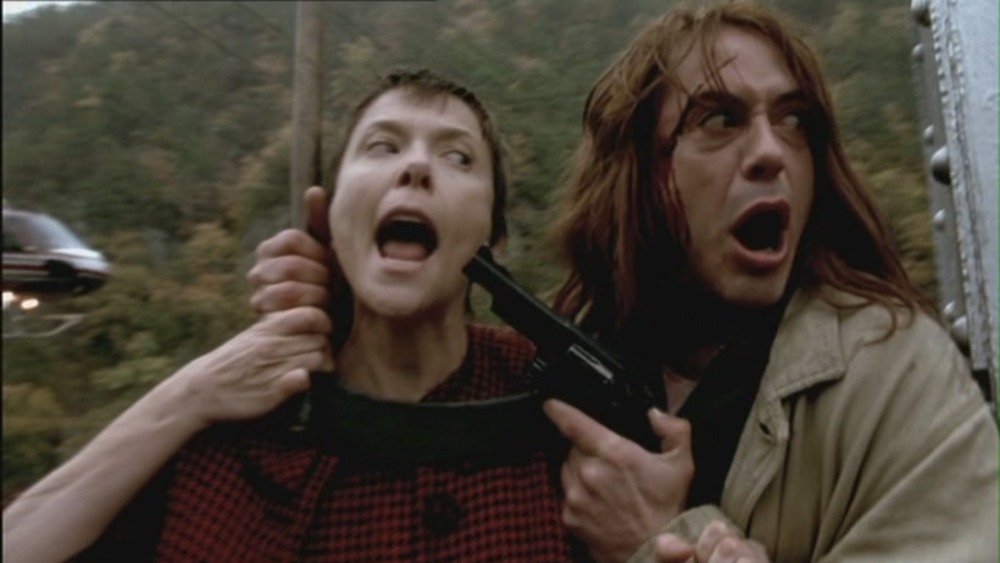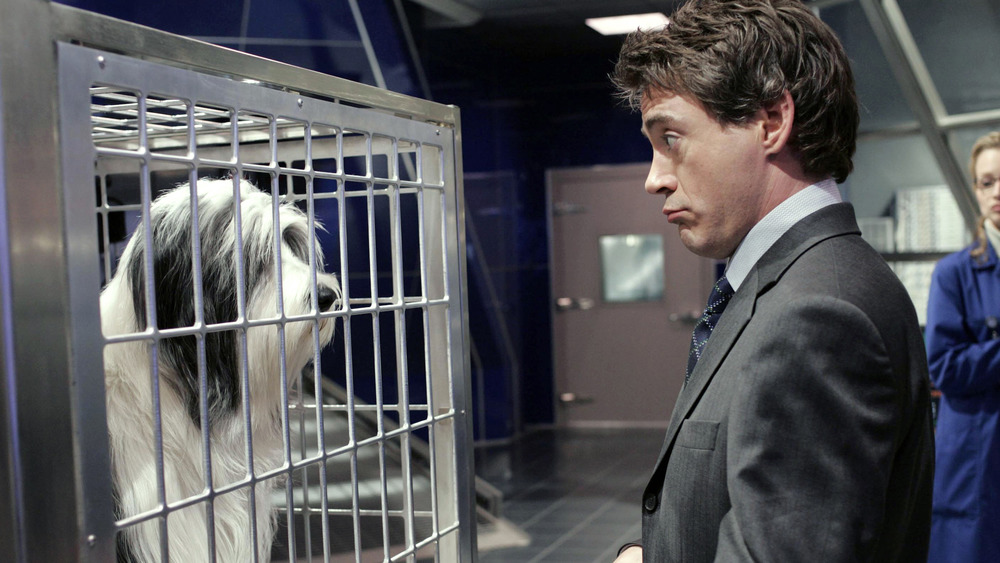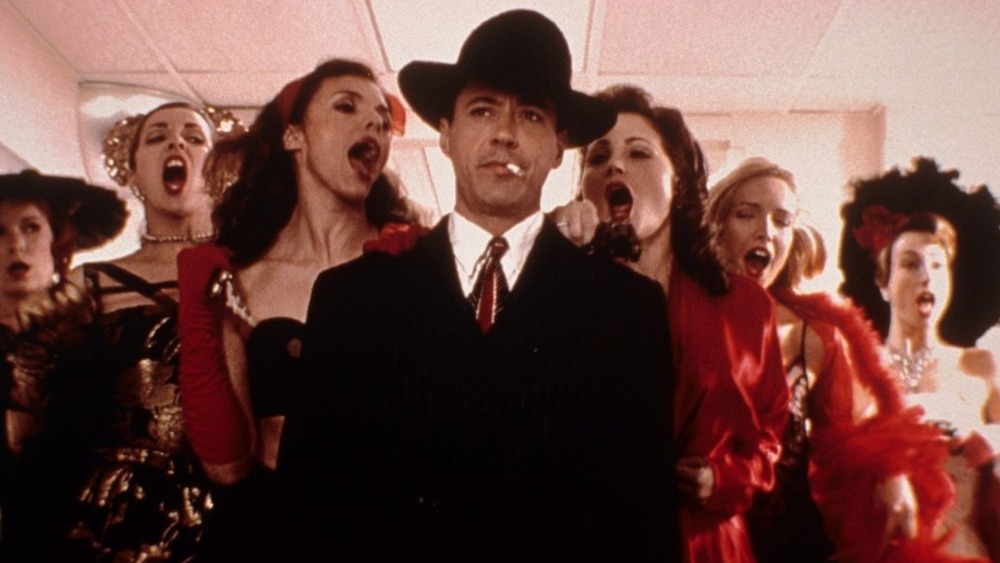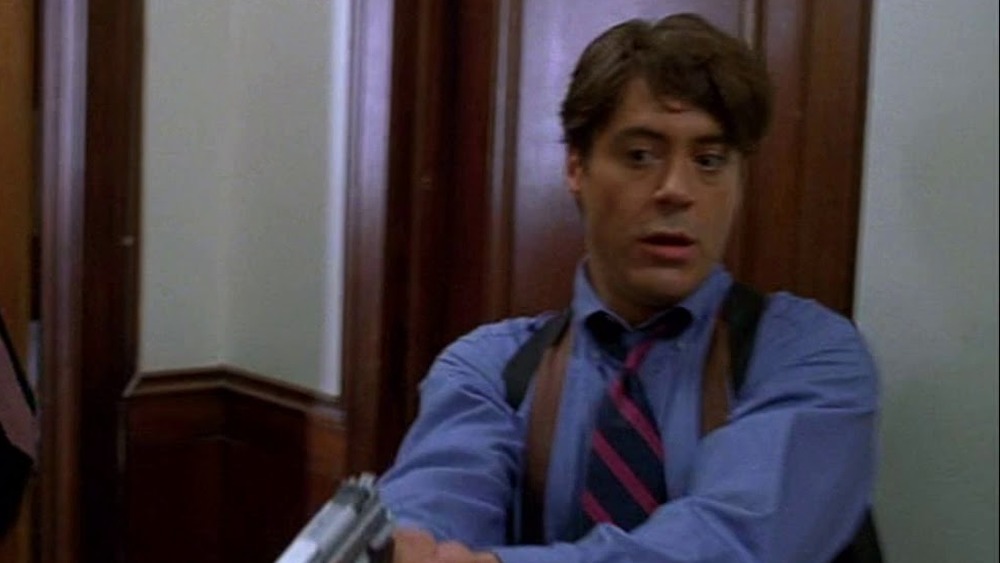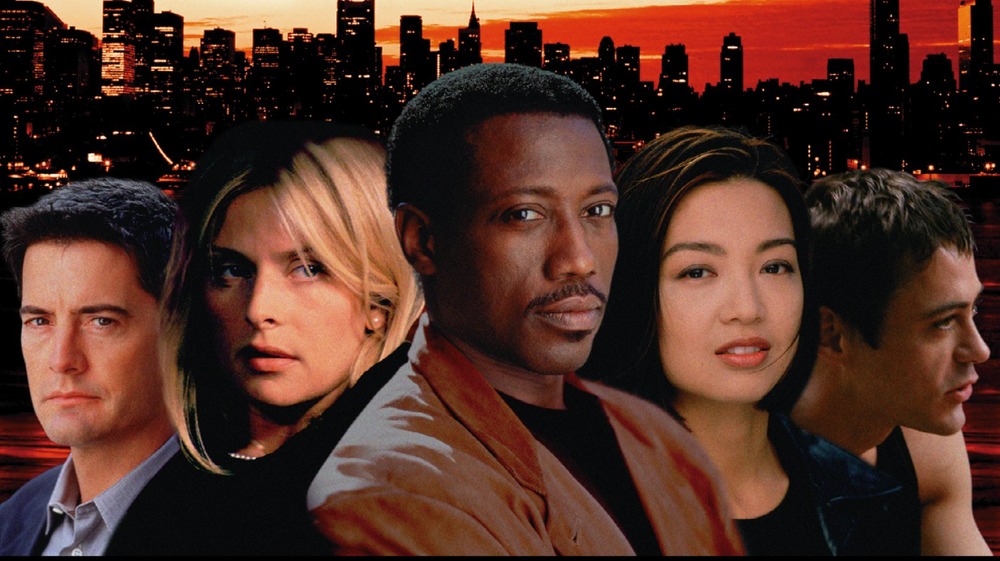The Forgotten Failures Of Robert Downey Jr.
Robert Downey Jr. is one of the most successful movie stars of his era. He has more money than most of us can conceive of in our wildest dreams. He's an inspiration to countless people all over the world. And before he got to this point, he signed up for many embarrassingly terrible films.
Back in 1996, RDJ openly described himself as "box office poison." Of course, that quote didn't exactly age well. Thanks to his essential run as Tony Stark, AKA Iron Man, in the Marvel Cinematic Universe, he's become an iconic talent. But that "box office poison" comment had merit, at the time. Even well-reviewed and widely-praised RDJ films of the pre-MCU era, Like Chaplin (1992), Wonder Boys (2000), Kiss Kiss Bang Bang (2005), and A Scanner Darkly (2006) were creative successes that nevertheless failed at the box office. Fate seemed to arrange for RDJ to pick really good movies that somehow lost money anyway.
To an extent, the wacky track record comes with the territory. Nobody who makes approximately 80 films during a 35-year career has anywhere near enough control to ensure each and every project turns out to be superb. And here's the thing: Having a bunch of flops under one's belt isn't shameful — it's a sign of a well-rounded career. With that in mind, we're here to take a look at Robert Downey Jr.'s forgotten failures, from the overbaked action flicks to the oddball musicals.
Johnny Be Good (1988)
Johnny Be Good was utterly destroyed by critics — and for good reason. The film was instantly doomed by the ill-conceived casting of its primary star. Everyone knows that in the 1980s, Anthony Michael Hall played nerds. His characters aren't good at football, they're awkward around girls, and they enjoy science-related activities, preferably when they're of a weird variety. So, without a doubt, the second audiences laid their eyes on this trailer, which depicts Hall as an athletically and socially sought-after jock, the fictional integrity of Johnny Be Good instantly collapsed.
Don't be fooled into thinking Hall is the only problem here, though: Johnny Be Good is a very, very bad film for lots of reasons. So awful is it, in fact, that Roger Ebert described it as "financial leakage, a squandering of resources equivalent to polluting a river or plowing under a rain forest." Though this film definitely does not warrant a critical reevaluation, it is historically significant as the nadir of 1980s teen movies. Moreover, it remains the only time Downey Jr. and Uma Thurman have ever appeared in the same project.
Gothika (2003)
Halle Berry spent the early '00s flying up and down on a metaphorical yo-yo. At the high points, she won an Oscar for 2003's Monster's Ball and helped launch a major superhero movie franchise with 2000's X-Men and 2003's X2. Yet right around the same time, she wound up in the infamously clunky Catwoman and the miserably-reviewed Gothika.
Now, Gothika wasn't a complete flop: It pulled down $140 million on a $40 budget, for one thing. At the very least, this psychological horror was immune to Downey Jr.'s self-alleged poisonous box office effect. Here, RDJ plays psychiatrist Dr. Pete Graham, who treats Berry's character — his former colleague — after she experiences an ostensible violent breakdown. Naturally, things aren't exactly as they seem. Is it high art? No. Is it entertaining? Yes — though, admittedly, horror hounds might find it a bit predictable. All in all, Gothika isn't a career pinnacle, but it's also not a total disaster.
Tuff Turf (1985)
According to Roger Ebert, someone actually says, "Life is not a puzzle to be solved; it is a mystery to be lived," at some point during the D-list John Hughes knockoff Tuff Turf. This should give you an idea of how much time and attention went into the script. But the reason we need to talk about Tuff Turf has nothing to do with its place at the bottom of the landfill of 1980s pop culture and everything to do with the MCU.
RDJ plays the best pal of James Spader's Poochie The Dog-style protagonist, Morgan Hiller. This means RDJ and Spader pretended to be close friends before they pretended to be mortal enemies in Avengers: Age of Ultron, two decades later. That's either a remarkable coincidence, or a testament to the cyclical, insular nature of Hollywood. Or hey, maybe it's a little from column A and a little from column B. Whatever the case, we don't recommend Marvel obsessives watch Tuff Turf. But considering it routinely pops up in MCU trivia contests, it doesn't hurt to know it exists.
Too Much Sun (1990)
Robert Downey Sr. directed this questionable satire, in which Eric Idle of Monty Python fame plays a gay man pretending to be straight as he attempts to impregnate a woman in order to secure an inheritance from his wealthy father. This concept reminds us of 1997's Chasing Amy, in the respect that it probably seemed progressive during the 1990s, but, to put it generously, no longer resonates as a particularly forward-thinking bit of cinema.
Take a moment to absorb Too Much Sun's trailer, which plays out like an Arrested Development episode that was banned for homophobia. But hey, if anyone gives RDJ any grief about Too Much Sun, he can always credibly tell them he was doing a favor for his dad. Sadly for Ralph Macchio, none of his immediate relatives worked in management-level positions on the film, which means he can offer no such excuse. Plus, he had to sport that criminally early-'90s mullet.
Saturday Night Live (1985)
When Marvel nerds see RDJ, they think "Iron Man." When comedy nerds see RDJ, they think, "Worst ... SNL ... season ... ever." Lorne Michaels' decision to experiment with SNL's set-up by casting dramatic actors for the show's 1985-1986 season — including a 20-year-old RDJ, Anthony Michael Hall, and Joan Cusack — ultimately led to catastrophe. But really, it all worked out in the long run.
Speaking to The Off Camera Show, RDJ pushed back against the notion that he's the worst SNL cast member of all time, and spelled out how his single season on the sketch comedy institution proved crucial for shaping the rest of his career. "I learned so much ... about what I wasn't," said RDJ. "I was not somebody who was going to come up with a catch phrase. I was not somebody who was going to do impressions. I was ... very ill-suited for rapid-fire sketch comedy."
In fact, RDJ recalls the season as a thrilling and positive experience. Plus, he got to meet David Bowie, which I think we'd all agree is worth looking silly on television. Take RDJ's word for it: "You're in a caveman outfit, and you're running to go from this set to that set, and you change into a spaceman outfit, and you, like, bump into David Bowie who's standing by a monitor because him and Lorne are buddies, and you go, 'Coolest Saturday night ever!'"
In Dreams (1999)
A surrealistic thriller featuring Annette Bening and directed by Neil Jordan, whose prior work includes 1994's Interview With The Vampire and 1992's The Crying Game, looks like an excellent idea on paper. When put into practice, however, In Dreams garnered dubious reviews and sank at the box office like a sack of hammers in a lake. Fortunately for Annette Bening, she also co-starred in 1999's Oscar-winning American Beauty, so if she felt any significant disappointment about how In Dreams turned out, it probably didn't last long.
If you're the sort of superhero movie fan who likes to wax hypothetical, you might find some food for thought in the notion of RDJ playing a murderous psycho. Today, he's very closely associated with snarky, egotistical do-gooder Tony Stark. But what if various elements of In Dreams had fallen into place, and RDJ wound up recognized specifically for his ability to portray a maniac? How far out into the multiverse do you think we have to travel until we arrive at an Earth where RDJ is primarily known for his performance as the Joker? We bet that planet's much closer than you might assume.
The Shaggy Dog (2006)
Y'know what? We've all done stuff we'd rather not for a paycheck. Perhaps RDJ wanted to add a new room to his house when he made The Shaggy Dog. Maybe he had to pay off some credit card debt he racked up in the '80s and forgot about. He might have lost a bet. Who knows? Not us. But if anyone deserves to take any flak over The Shaggy Dog, it's definitely star Tim Allen and director Brian Robbins. We refuse to act like The Shaggy Dog is RDJ's fault.
Seriously, though – why do we have so many movies about excessively career-oriented fathers who learn they should pay more attention to their dumb kids? Why can't we have just one movie about an emotionally available but lazy father who learns the value of a hard day's work? Or better yet, how about a movie where neglected children find out they don't need their self-involved parents' approval to grow up into well-adjusted, prosperous adults?
The Singing Detective (2003)
This film feels like one of RDJ's earlier attempts to cross over from quirky auxiliary actor to leading man. The parallels between RDJ's character in 1987's Less Than Zero and his real life tend to overshadow the comparatively minor downside of that movie: He did such a good job playing the main character's unstable best friend that it saddled him with supporting roles until Kiss Kiss Bang Bang came along. But before that, there was The Singing Detective.
Despite an all-star cast including RDJ, pre-scandal Mel Gibson, Katie Holmes, Adrian Brody, and Robin Wright, this project did not manage to make even half a million dollars, making it a substantial flop even by 2003's standards. It could be that an American feature-length adaptation of a BBC comedy series, half of which takes place in the protagonist's imagination, might've been too much for mainstream audiences to comprehend. Also, did we mention RDJ's character is named Dan Dark? But hey, interesting fact: RDJ is a very talented vocalist. For proof, just check out this film's soundtrack, on which he belts out a tune.
U.S. Marshals (1998)
Technically, we can call U.S. Marshals, a spin-off to 1993's The Fugitive, a failure, but we've got to load that statement up with context and qualifiers. A lot of the film's negative press focuses heavily on its inability to live up to its predecessor. More importantly, it was squashed in the box office by the late-'90s leviathan that was Titanic, as were all other movies released around that time. Unlike its nautical namesake, nothing could sink Titanic – not even RDJ.
Let's face facts: At the end of the day, RDJ's just another person like the rest of us. Would anyone in his shoes turn down an opportunity to appear in a film alongside screen and television legend Joe Pantoliano? Granted, the world of 1998 did not yet know of the Pantoliano we revere today for his brilliant contributions to The Matrix (1999), Memento (2000), and his role as the terrifying villain Ralph Cifaretto on The Sopranos. If RDJ wasn't a prescient kind of guy, he probably would've turned down Iron Man. But of course, he didn't do that, which means he is a prescient kind of guy, and definitely knew Pantoliano was going to kick major butt during the next few years.
One Night Stand (1997)
Most of RDJ's forgotten failures are movies that nobody talks about because they're kind of uninteresting. That isn't the case with One Night Stand, which was director Mike Figgis' follow-up to Leaving Las Vegas (1995), and written by Basic Instinct (1992) screenwriter Joe Eszterhas. (Oddly, Eszterhas renounced his writing credit for One Night Stand, even though he was perfectly okay with the world knowing he wrote Showgirls a few years earlier.) Moreover, it's stacked with actors currently best-known for their roles in superhero franchises, including RDJ, Wesley Snipes, Kyle MacLachlan, and Ming-Na Wen — yes, Special Agent Dale Cooper is a superhero.
RDJ's performance as Charlie, an AIDS patient on his last legs, is the only aspect of this film that garnered much praise. In fact, at the time, The LA Times reported RDJ might've been up for an Oscar. As this movie coincided with the frightening zenith of RDJ's struggle with addiction, had he won, he might have been forced to accept his award while behind bars. RDJ didn't get an Oscar nomination, but he definitely had a pretty interesting 1997 — and thankfully, a much brighter future.
